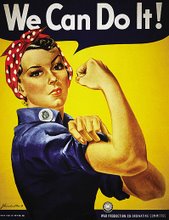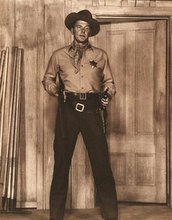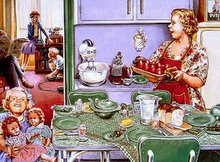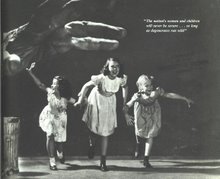Sanctimonious America had two basic problems with Nabokov’s Lolita, one obvious one was the fact that he was Russian and the other was the subject material – pedophilia. In 1956 Nabokov published a response to the controversy, defending his work and the attack that he was anti-American. Nabokov stated that, “Their refusal to buy the book was based not my treatment of the theme but on the theme itself…”, however, I have to disagree with Nabokov’s assumption. The American family became central to fighting against the invisible communist threat. The American people were bombarded with propaganda with the threat of the invisible enemy. The problem with Humbert Humbert was that he was intelligent and witty and very charming monster. Humbert is perfectly willing say that he is a monster, but a reader can not help find themselves less and less eager to agree with him. Because he is likable, he is perfect archetype for the invisible Cold War enemy. In describing his attraction to the nymphet, he admits that he is a monster, but Nabokov's lyrical style is just as seductive as Lolita herself: "You have to an artist and a madman, a creature of infinite melancholy, with a bubble of hot poison in your loins and a super-voluptuous flame permanently aglow in your subtle spine (oh, how you have to cringe and hide!), in order to discern at once, by ineffable signs-the slightly feline outline of a cheekbone, the slenderness of a downy limb, and other indices which despair and shame and tears of tenderness forbid me to tabulate-the little deadly demon among the wholesome children; she stand unrecognized by them and unconscious herself of her fantastic power."
Also, the reader finds themselves laughing at very inappropriate passages in the book (especially when he refers to Charlotte Haze, Lolita's mother); one can not help but find humor in some of Humbert Humbert's language:
"Thursday. Last night we sat on the piazza, the Haze woman, Lolita and I. Warm dusk had deepened into amorous darkness. The old girl had finished relating in great detail the plot of a movie she and L. had seen sometime in the winter. . . We sat on cushions heaped on the floor, and L. was between the old girl and me (she had squeezed herself in the pet)."
Rosie the Riveter

Who was Rosie the Riveter
The song Rosie the Riveter was already popular when Actor Walter Pidgeon discovered the real thing--Rose Will Monroe, a Ford employee who built B-24 and B-29 bombers at the Willow Run Assembly Plant in Michigan.
Rose went on to make war bond promotional films and was the inspiration for the Rosie the Riveter poster, symbolizing all U.S. women who worked in manufacturing jobs to support the World War II effort.
Ronald Reagan

The perfect American male
Ronnie Reagan was consider the perfect example of the ideal masculine male. Divorced his "career" oriented wife Jane Wyman to marry Nancy Davis, an actress who promptly agreed to give up her career to be a full-time wife and mother.
Kubrick

Lolita (1962)-Sue Lyon
Humbert's Lolita
Lolita, light of my life, fire of my loins. My sin, my soul, Lo-lee-ta: the tip of the tongue taking a trip of three steps down the palate to tap, at three, on the teeth. Lo. Lee. Ta. She was Lo, plain Lo, in the morning, standing four feet ten in one sock. She was Lola in slacks. She was Dolly at school. She was Dolores on the dotted line. But in my arms she was always Lolita.
The Perfect Family

A Woman's Duty
"The ideological connections among early marriage, sexual containment, and traditional gender roles merged in the context of the cold war. Experts called upon women to embrace domesticity in service to the nation, in the same spirit that they had come to the contry's aid by taking wartime jobs. To meet the challenge of the postwar era, women were to marshall their energies into a "New Family Type for the Space Age." Women's domestic roles needed to be infused with a sense of national purpose."
J. Edgar Hoover

How Safe is You Daughter?
J. Edgar Hoover
"The nation's women and children will never be secure...so long as degenerates run wild."
Bill Haley and His Comets

Thirteen Women (And Only One Man In Town)
Last night I was dreamin', dreamed about the H-bomb
Well, the bomber went off and I was caught
I was the only man left on the ground.
There was thirteen women and only one man in town.
And as funny as it may be, the one and only man in town was me
Well, thirteen women and me the only man around...
I had two gals every morning, seein' that I was well fed
And believe you me, one sweetened my tea
While another one buttered my bread
Two gals gave me my money, two gals made me my clothes
And another sweet thing bought me a diamond ring
About 40 carats I suppose...
I had three gals dancin' the mambo,
Three gals ballin' -the-jack
And all of the rest really did their best
Boy, they sure were a livley pack...
I thought I was in heaven, and all of these angels were mine
But I woke up and I head for the train
'Cause I had to get to work on time....
-Bill Haley and His Comets, 1954
Wednesday, April 25, 2007
Masculinity
During the Cold War era there was an excessive preoccupation with masculinity. Popular culture put a new premium on hard masculine toughness and rendered anything less than that soft and feminine and, as such, a real or potential threat to the security of the nation.
Propaganda - Example II
In 1951, for example, Charles Walter Clarke, a Harvard physician and executive director of the American Social Hygiene Association, published a major article in the Journal of Social Hygiene on the dangers of atomic attack. "Following an atom bomb explosion," he wrote, "families would become separated and lost from each other in confusion. Supports of normal family and community life would be broken down...there would develop among many people, especially youths...the reckless psychological state often seen following great disasters." The preparedness plan that Clarke devised to cope with this possibility centered not on death and destruction or psychological damage, but on the potential for sexual chaos.
Propaganda-Example I
"The American press and the radio have turned in a splendid performance as the watchdogs of our liberties. They can increasingly protect our children by turning the spotlight of publicity on sex degenerates and the cesspools of vice which nurture their development, at the same time protecting the identities of innocent victims and their families, once a sex fiend has struck."
-J. Edgar Hoover, American Magazine 1947 (How safe is your daughter?)
It is interesting that Mr. Hoover uses the words "liberties" and "cesspools of vice" to make his statement about protecting our children against sex offenders. He is obviously targeting the current mind set of the time, that not only did our political enemies threaten to inflate our government but they posed a serious threat to our families. They American public was being lead to believe that the "foreign" threat was composed of subversive degenerates; that threatened the family, property, and personal and national identity. These "foreign" enemies easily melted into our culture.
Another example of this media propaganda can be seen in the May 1953 issue of Ladies Home Journal, in the article entitled "To protect your child from sex offenders," "Unfortunately, respectability and pre-eminence in the community are no criteria for judging perversion. A corrupter of children may be anyone. And even though his guilt is known, parents, out of consideration for his family or respect for the man he once was, will not prosecute him."
-J. Edgar Hoover, American Magazine 1947 (How safe is your daughter?)
It is interesting that Mr. Hoover uses the words "liberties" and "cesspools of vice" to make his statement about protecting our children against sex offenders. He is obviously targeting the current mind set of the time, that not only did our political enemies threaten to inflate our government but they posed a serious threat to our families. They American public was being lead to believe that the "foreign" threat was composed of subversive degenerates; that threatened the family, property, and personal and national identity. These "foreign" enemies easily melted into our culture.
Another example of this media propaganda can be seen in the May 1953 issue of Ladies Home Journal, in the article entitled "To protect your child from sex offenders," "Unfortunately, respectability and pre-eminence in the community are no criteria for judging perversion. A corrupter of children may be anyone. And even though his guilt is known, parents, out of consideration for his family or respect for the man he once was, will not prosecute him."
Tuesday, April 24, 2007
Popular Culture
Bill Haley's song lyrics are an example of popular culture during the cold war that connected the unleashing of the atom and the unleashing of sex.
The invisible Enemy
The Cold War had battlegrounds all over the world, and it was a hot enough war in some of them, but in the main battleground, Western Europe, it was a war for hearts and minds—an idea war, an image war, and a propaganda war. The target audience for cultural propaganda in the Cold War was foreign élites—in particular, left-wing intellectuals and avant-garde writers and artists who might still have some attachment, sincere, sentimental, or opportunistic, to Communism and the Soviet Union. Therefore when in 1953 when Vladimir Nabokov released his Lolita to the world it was not surprising that four separate American publishers rejected Nabokov's divisive novel, forcing the Russian-born author to take his manuscript to Paris, where it was quietly published.
Subscribe to:
Posts (Atom)